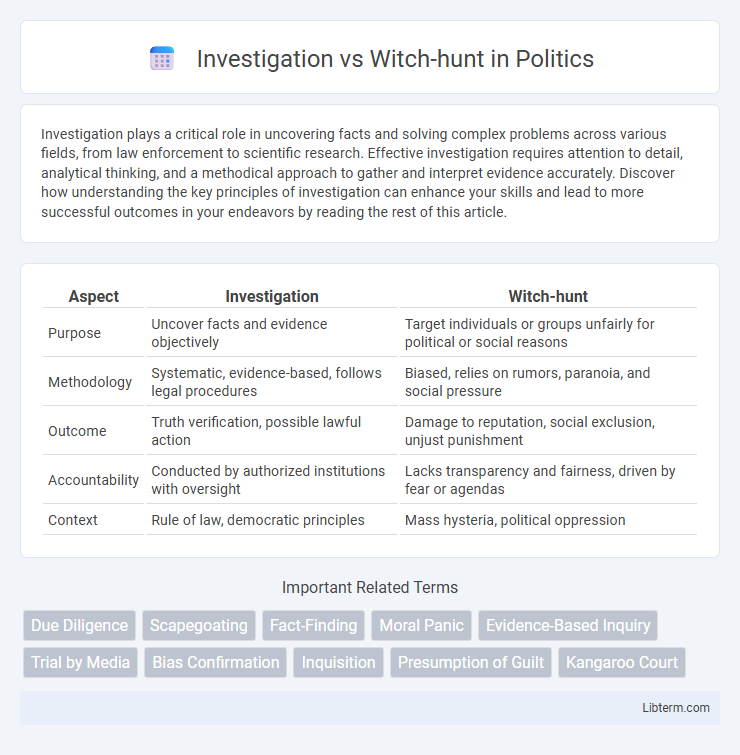Investigation plays a critical role in uncovering facts and solving complex problems across various fields, from law enforcement to scientific research. Effective investigation requires attention to detail, analytical thinking, and a methodical approach to gather and interpret evidence accurately. Discover how understanding the key principles of investigation can enhance your skills and lead to more successful outcomes in your endeavors by reading the rest of this article.
Table of Comparison
| Aspect | Investigation | Witch-hunt |
|---|---|---|
| Purpose | Uncover facts and evidence objectively | Target individuals or groups unfairly for political or social reasons |
| Methodology | Systematic, evidence-based, follows legal procedures | Biased, relies on rumors, paranoia, and social pressure |
| Outcome | Truth verification, possible lawful action | Damage to reputation, social exclusion, unjust punishment |
| Accountability | Conducted by authorized institutions with oversight | Lacks transparency and fairness, driven by fear or agendas |
| Context | Rule of law, democratic principles | Mass hysteria, political oppression |
Understanding the Difference: Investigation vs Witch-hunt
An investigation is a systematic and evidence-based process aimed at uncovering facts and ensuring justice, whereas a witch-hunt involves targeting individuals based on fear, suspicion, or bias, often disregarding due process. Investigations rely on objective criteria and legal standards, while witch-hunts exploit hysteria and manipulate public opinion to vilify perceived enemies. Understanding this difference is crucial to protect civil liberties and uphold fairness in legal and social contexts.
Defining Genuine Investigations
Genuine investigations rely on evidence-based methods, impartiality, and adherence to legal standards to uncover truth and promote justice. They prioritize transparency, procedural fairness, and protection of rights, ensuring accusations are substantiated before conclusions are drawn. In contrast, witch-hunts often involve biased motives, lack credible evidence, and target individuals unfairly, leading to social harm and miscarriages of justice.
Characteristics of a Witch-hunt
A witch-hunt is characterized by irrational fear, mass hysteria, and targeting individuals based on insufficient or fabricated evidence, often fueled by social or political motives rather than objective facts. Unlike impartial investigations, witch-hunts rely on scapegoating and suppress dissent, leading to unjust persecution and violation of rights. This environment breeds paranoia and undermines due process, prioritizing accusation over proof.
Historical Contexts of Witch-hunts
Witch-hunts in historical contexts were driven by societal fears and often fueled by religious or political motives, leading to mass accusations without substantial evidence, unlike genuine investigations that rely on factual inquiry and due process. These episodes, notably during the Early Modern period in Europe and colonial America, resulted in widespread persecution based on superstition and scapegoating rather than objective assessment. Understanding the distinction highlights the dangers of abandoning rational investigation in favor of fear-driven witch-hunts, which caused significant social and legal injustices.
Motivations Behind Modern Witch-hunts
Modern witch-hunts often stem from sociopolitical anxieties, scapegoating marginalized groups under the guise of maintaining moral or social order. Investigations aim to uncover truth through evidence and due process, whereas witch-hunts prioritize suspicion and fear, leading to unjust persecution. Understanding motivations behind these witch-hunts reveals how fear-driven narratives override rational inquiry, fueling cycles of discrimination and violence.
Legal Standards in a Proper Investigation
Proper investigations adhere strictly to legal standards such as probable cause, evidence-based procedures, and impartiality to ensure fairness and protect individual rights. Unlike witch-hunts, which are characterized by bias, presumption of guilt, and lack of due process, legitimate investigations follow established protocols including obtaining warrants, respecting constitutional protections, and allowing for defense representation. These legal safeguards maintain the integrity of the investigative process and prevent abuses of power or wrongful accusations.
Warning Signs of a Witch-hunt Mentality
Warning signs of a witch-hunt mentality include scapegoating individuals without evidence, spreading fear and paranoia, and prioritizing punishment over truth. Investigations rely on facts, transparency, and due process to uncover wrongdoing, whereas witch-hunts target perceived enemies based on rumors or biases. Recognizing emotionally charged accusations and the breakdown of impartiality helps distinguish genuine inquiries from destructive witch-hunts.
Media Influence on Investigations and Witch-hunts
Media influence significantly shapes public perception during investigations and witch-hunts by amplifying narratives that may lack factual basis, often leading to biased outcomes. Sensationalized reporting and social media viral trends can pressure authorities to act prematurely, transforming legitimate inquiries into witch-hunts driven by public outrage rather than evidence. The interplay between media coverage and legal processes highlights the need for responsible journalism to maintain investigative integrity and prevent miscarriages of justice.
Protecting Rights During Investigations
Investigations must ensure the protection of individual rights by adhering to due process, preserving evidence integrity, and maintaining confidentiality throughout the procedure. Unlike witch-hunts, which rely on bias, rumors, and unfair targeting, legitimate investigations are grounded in factual evidence and legal standards to safeguard against wrongful accusations. Ensuring transparency and accountability within investigative protocols strengthens trust and upholds justice.
Preventing Witch-hunts in the Justice System
Effective investigations in the justice system rely on evidence-based procedures and impartiality to prevent witch-hunts, which are driven by bias, fear, and unsubstantiated accusations. Implementing rigorous standards for evidence collection, peer review, and accountability ensures that investigations do not devolve into persecution based on rumors or political motives. Transparent processes and legal safeguards protect individuals' rights and uphold the integrity of the justice system, reducing the risk of wrongful convictions stemming from witch-hunt dynamics.
Investigation Infographic

 libterm.com
libterm.com